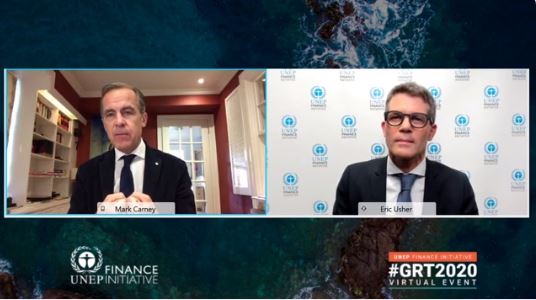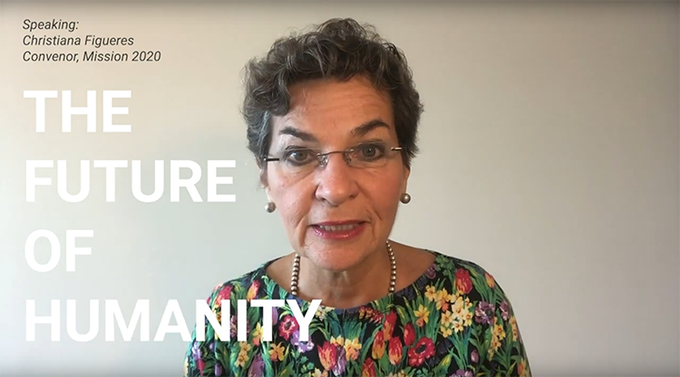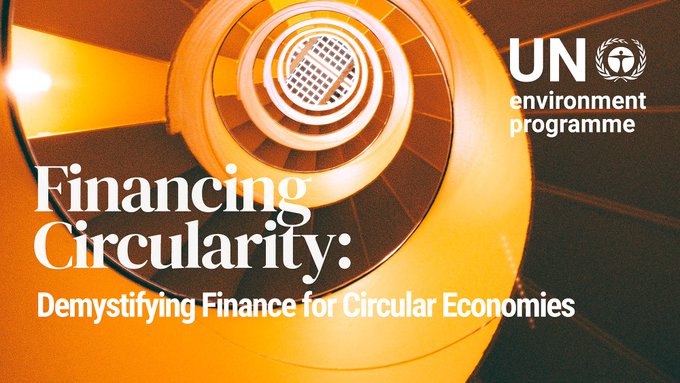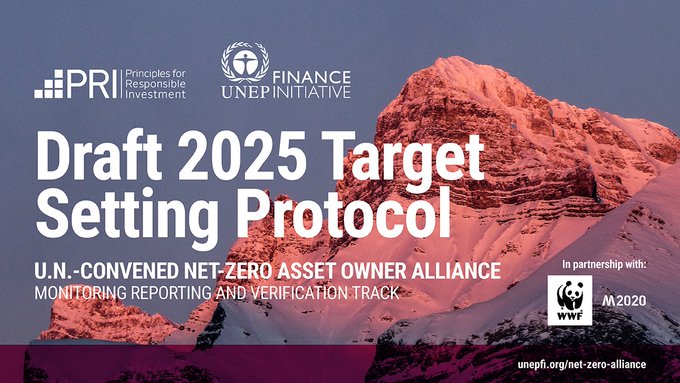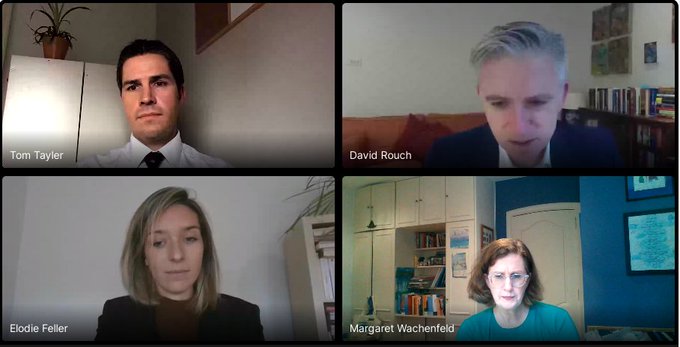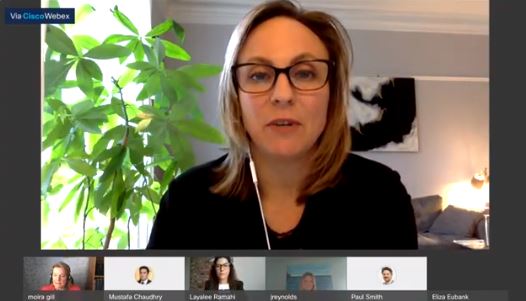UNEP FI saw more than 2500 participants join Day 1 of its 16th Global Roundtable, held virtually for the first time ever, under the theme “Financing a Resilient Future”.
The stellar line-up of speakers was led by Amina Mohammed, Deputy Secretary General, United Nations, who gave the opening keynote address by reminding participants that sustainable finance wields an enormous opportunity to transform our markets, businesses, societies and environment. Economic systems and financial markets must put a fair price and invest in nature to shift finance away from destructive activities and towards nature-based solutions.
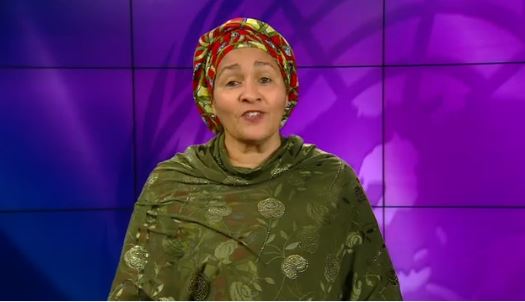
Pictured: Amina Mohammed, Deputy Secretary General, United Nations
Kristalina Georgieva, Managing Director of the International Monetary Fund (IMF), outlined three priorities for financing a resilient future: channel investments into climate resilient infrastructure and low carbon industries; put the right global price on carbon – from its current $2/tonne to around $75/tonne to achieve the goals of the Paris Agreement, as well as implementing a carbon-price floor across major emitter nations, and enhancing the sustainable finance sector to mobilise green investments.
“We know that climate change presents a major threat to long term growth and prosperity and it has a direct impact on the economic well-being of all countries, so it is critical that we have policies to mobilise financial resources for the green transformation that is so urgently needed. As we emerge from the pandemic, we have the chance to make this transformation and build forward low-carbon, climate-resilient economies.” – Kristalina Georgieva, Managing Director of the International Monetary Fund (IMF)
UNEP FI Head, Eric Usher noted that while communities have faced a challenging year with the COVID-19 pandemic, the finance industry has stepped up and kept the economy functioning while working closely with governments. He highlighted that in a world of uncertainty, what we know is that the role of responsible finance, the sharpening of the environmental, social and governance (ESG) agenda to deliver real-world impacts, and the alignment of portfolios with international frameworks to protect people and planet are more critical than ever. As we build back, decisions will need to be made whether to prop up the destructive systems of the past or to invest in transforming our economies of the future.
Mark Carney, UN Special Envoy on Climate Action and Finance, a former Governor of the Bank of England, saluted UNEP FI on its work with its two major initiatives, the Principles for Responsible Banking and the UN-convened Net Zero Asset Owner Alliance as good examples of translating principles into action. In a fascinating conversation with Eric Usher, he went on to say that while the net-zero destination is important, it will not happen overnight and there will be delta or change as we embark on a whole economy transition to navigate the climate crisis. He emphasised the importance of financial institutions not just managing the risk but also seizing the opportunities in tackling climate change and doing that across all sectors of the real economy and across all mainstream finance sectors, and called for banks to link executive pay to the goals of the Paris Agreement on Climate Change.
Pictured: Mark Carney, UN Special Envoy on Climate Action and Finance and
Eric Usher, Head of UN Environment Programme Finance Initiative
Johan Rockström, Director, Potsdam Institute for Climate Impact Research told delegates that planetary boundaries provide a scientific target for a safe operating space, with science able to provide the guardrails for sustainable financial sector investment. He said the financial sector is best placed to measure and value risk, and it’s important for them to combine that risk assessment with the evidence that investing in sustainability makes sense for better economic development. The financial sector is one of the most important actors to determine where the fluxes are and to tell the story of opportunity – with sustainability as modernity and the path to the future.
CEOs from banks that have signed the UN’s Principles for Responsible Banking shared examples of the progress they have made in implementing the sustainability framework. For example, Joshua Oigara, KCB Group, explained the positive impact they are having on society as they operate at the forefront of financial inclusion, extending microloans to youth and women. Arshad Mohamed Ismail, Bank Pembangunan Malaysia, a new signatory to the Principles for Responsible Banking, explained how the bank has used an impact assessment framework to evaluate every transaction against five of the Sustainable Development Goals, and guides customers to improve their scores over time. Measuring impact is a crucial element of banks’ implementation of the Principles for Responsible Banking.
Christiana Figueres, Convenor of Mission2020 pointed out that where finance goes, so go emissions, or emission reductions. Since every financial decision today locks in emissions for decades to come, the finance sector has a primal role to play in addressing climate change in a timely fashion and holds tremendous leverage in determining our future. Efforts to decarbonize are about managing financial risk, increasing financial stability in the medium and long-term and ultimately it’s about prosperity.
Pictured: Christiana Figueres, Convener Mission 2020
The high-level dialogue on the role of regulators in delivering a sustainable financial system focused on aligning international efforts on sustainable finance, Chairs of the Network for Greening the Financial System (NGFS) and the Sustainable Insurance Forum (SIF) Frank Elderson and Geoff Summerhayes explored recent developments to steer the financial industry and regulation to converge solutions to the fragmented approaches to regulation on a global level, as well as leadership roles in international finance. They covered the need for a harmonized and sound policy and regulatory framework that ensures clarity of purpose, protects consumers, supports market development, and facilitates transition in key economic sectors to meet the Sustainable Development Goals.
David Blood, Co-founder and Senior Partner, Generation Investment Management, explained that the next 10 years will be the most critical for the future of the planet and humanity. A crucial component of our success will depend on transforming the way in which financial markets operate to achieve a resilient, healthy, fair, net zero economy. To meet global environmental and social goals, businesses and investors must take responsibility for the impact of their decisions on the world. Assessment of how legal frameworks help, or hinder, that transformation to sustainability impact management is an important and missing piece of the puzzle.
Launches at the Global Roundtable 2020
The event saw the launch of a report Financing Circularity: Demystifying Finance for the Circular Economy revealing how financial institutions can advance the transition to circular economies, the consultation launch of a Target Setting Protocol on plans for UN-convened Net-Zero Asset Owner Alliance members to reduce greenhouse gas emissions by 2025, and the release of a UNEP paper Building a Greener Recovery: Lessons from the Great Recession (see below).
Financing A Circular Economy
This session saw the launch of a new UNEP report that highlights the critical role of banks, insurers and investors in advancing circular economies and supporting sustainable production and consumption. Panellists discussed how moving from linear economies to circular ways of doing business will require a different mindset from financiers as well as cooperation between business, financiers and governments. To help financial institutions access the trillions of dollars in business opportunities expected from the transition to circular economies that use resources more efficiently while minimizing pollution and waste, UNEP FI’s report Financing Circularity: Demystifying Finance for the Circular Economy provides technical insight and recommendations for financial institutions to integrate circularity into business strategies and re-orient loans and investments towards more sustainable technologies and innovative business models.
The news release can be found here and the report can be found here.
The New Climate Leadership in Finance in Finance: The Race to Net-Zero
Thirty of the world’s largest investors with $5 trillion assets under management have collectively agreed on concrete portfolio targets that follow the Intergovernmental Panel on Climate Change (IPCC) 1.5 °C scenario for the next five years.
UN-convened Net-Zero Asset Owner Alliance members plan to implement greenhouse gas (GHG) emissions reductions in the 16% to 29% range by 2025 from 2019, and the Aliance is consulting on a draft 2025 Target Setting Protocol which is integral to coherent and comprehensive plans to reduce emissions, increase investment in the net-zero emissions transition and enhance influence on markets and government policies.
The Protocol enables Alliance members to employ the combination of approaches that best supports their unique decarbonization and engagement strategies and acknowledges their current different carbon levels. Each member is unique and as such may identify unique levers that exist within their institutions for accelerating net-zero emissions. They also have different investment scopes, strategies, internal governance structures and levels of exposure to certain high-emitting sectors
In this way the Alliance members aim to have “transparent, and unique” targets, which suit individual institutions, but which can also be aggregated such that progress for individual members and for the Alliance as a whole can be tracked and reported transparently.
News release can be found here and the Draft 2025 Target Setting Protocol can be found here.
You can also find a session recording here and a video about the Net-Zero Asset Owner Alliance here.
Günther Thallinger, Member of the Board of Management, Investment Management, Environmental, Social and governance (ESG), Allianz: “We have been working on approaches to steer portfolios towards net zero and an approach to assess the greenhouse gas emissions of portfolios. We are looking forward to experts coming up with their proposals to enhance our approach to define a first interim target towards a net zero 2050. That target will lie in the range of 16-29% greenhouse gas reduction by 2025. Every member of the Alliance is now working on such an individual target. To achieve this, we need to achieve a change in the economies, to achieve real-world impact. We need approaches based on scientist inputs, climate models and scenarios, to define pathways for individual assets, from directly owned real estate to publicly listed companies.”
Building Back Better: Financing a Resilient Future
Elliott Harris, UN Assistant Secretary-General for Economic Development and Chief Economist in the UN Department of Economic and Social Affairs (UN DESA) highlighted the need to accelerate implementation of the Agenda 2030 as a foundation for recovery of the current crisis, and the important role that the financial sector has to play to achieve this.
Edward Barbier, a professor at America’s Colorado State University and the author of UNEP’s new report Building a Greener Recovery: Lessons from the Great Recession highlighted the need for long-term public investment and innovations in industrial strategy for a greener recovery to build back better, as well as the need to change incentives and target pricing reforms at fossil fuels and carbon. The report calls on governments to develop concrete strategies to combat environmental decline as they rebuild their economies from COVID-19, and is the first in a series of UNEP reports designed to help countries build back more sustainably from the pandemic.
The news release can be found here and the report can be found here. You can also find a session recording here
Edward Barbier, Distinguished Professor, Colorado State University: “The difference between 2008/9 and now has to do with perceptions of risk. One area where we are seeing a convergence of interest between the business sector, financial sector, policymakers and academia is on recognizing that risks from another pandemic or climate change are in the real economy. We have to think of the longer-term path that we want to be on and whether we want to come back with a greener economy that’s more productive and innovative, and that will spread the benefits more. The challenge is for us to think about the future we want.”
In-depth sessions:
A Legal Framework for Impact: Investing for Sustainability Impact
While it is widely acknowledged that we need to shift to a more sustainable financial system and that impact management is central to achieving this, it is not yet understood how legal frameworks currently support investors to drive this transition.
This session discussed the project ‘A Legal Framework for Impact’, a major research project commissioned by the PRI, UNEP FI and The Generation Foundation to Freshfields Bruckhaus Deringer, which is examining how investors in major jurisdictions can manage their fiduciary and sustainability impact duties and what happens if they are in conflict.
Mainstreaming Climate Risk Disclosure
This session covered why climate disclosures under frameworks such as the TCFD recommendations matter for financial institutions from a firm, regulatory and stakeholder perspective, with speakers from the Bank of England, Citi, Potsdam Institute and the US Commodity Futures Trading Commission. Panellists discussed climate models, disclosures and regulatory change.
Building Societal Resilience through Finance
This session looked at the role of the financial sector to build societal resilience and the approaches to working collectively with stakeholders to bridge inequalities and building stronger communities. Panellists looked at the mechanisms for financial inclusion from a just transition framework, addressing systemic risk and injustice in the transition to a low-carbon economic future in a post-Covid world.
Portfolio Alignment with the Paris Agreement
This session explored how we might align our investment portfolios with the goals of the Paris Agreement, which is crucial in helping us to capture opportunities and drive necessary decarbonization. This helps minimise the negative consequences of the impacts of climate change and the transition under way. The panellists also discussed the role of policy as well as industry views on divestment and capital reallocation.
Climate Risk Management: Filling the gaps
North America-based financial institutions shared the challenges facing them as they strive to improve climate risk management and disclosures, and how they have been doing it in their businesses. A message that was echoed throughout the day was that more resilient economies cannot be achieved by single institutions, rather the industry needs to work together with support of policymakers. Financial institutions also need to transition to low-carbon economic activities with their clients, taking them with them, rather than purely divesting industries such as oil and gas.
North America Beyond Fossil Fuels: Syndicated transition
This session looked at the sustainable finance landscape for North American institutions, focusing on the region’s specific energy transition outlook. The US Commodity Futures Trading Commission (CFTC) Commissioner Rostin Behnam, sponsor of the groundbreaking Managing Climate Risk in the U.S. Financial System Report and Climate-Related Market Risk Subcommittee, highlighted systemic climate-related risks to the US financial system and the expectation that these risks will exceed short- to medium-term transition risks in the long-term, as the region moves to a low-carbon economy, focusing more on renewables and away from fossil fuels. Financial institutions as allocators of capital highlighted their role in asking companies to do more, supporting their knowledge curve, and helping them in the transition journey that leaves no one behind. The panel was keen for the agenda to advance, acknowledging progress on TCFD for consistent and comparable information, and called for a more proactive approach from regulators to intervene and mandate disclosures for a more efficient and effective transition.
UNEP FI is looking forward to day 2 of the GRT2020 on 14 October- please watch live and find recordings here.




